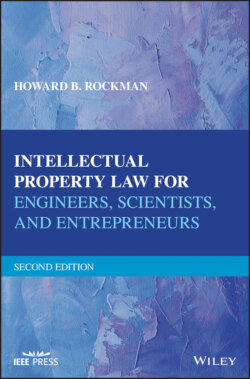Читать книгу Intellectual Property Law for Engineers, Scientists, and Entrepreneurs - Howard B. Rockman - Страница 45
2.12 JURISDICTION
ОглавлениеThe jurisdiction of a court is defined as its scope of authority to hear and determine the causes of action presented to the court, given either by a legislature or U.S. or state Constitution. The jurisdiction of a court is dependent upon the geographical region in which the injury or activity occurred, where the individuals reside or do business, to types of cases, and possibly to the amount of money or type of relief concerned. The courts not only have jurisdiction over the people in front of them, they have jurisdiction over those individuals’ property, both real and personal, located within their assigned geographical limits. The courts have the authority under the law to take property of one party in satisfaction of a judgment in favor of another party, where the latter was damaged by the conduct of the one party. However, a court has no authority in a state over property lying outside its territorial limits. For example, a court in Illinois could force a defendant to sell the defendant’s property in Illinois to satisfy a judgment against the prevailing plaintiff; however, the court would have no authority to force the defendant to sell property located in another state.
Regarding personal jurisdiction, the court has jurisdiction over persons who have had sufficient contacts with the state, as long as the exercise of jurisdiction does not offend traditional notions of fair play and substantial justice, whether the persons are residents or not. For example, assume a company or individual is doing business on the Internet offering items for sale worldwide. Even though the Internet‐using company is lodged in one building in one state, the mere fact of offering goods over the Internet throughout the country will give a court in another state jurisdiction over that person or company and that business, even though that person or company has never been in the state in which the action is brought.
The courts initiate their jurisdiction by serving the accused person with a summons, or other legal process. A witness is served with a subpoena to compel the appearance of that witness before a court. Summonses and subpoenas can be served in person or by mail.
Jurisdiction of courts may also be limited as to the type of cases they have authority to adjudicate. For example, under many state systems, criminal courts do not handle civil matters. In the federal system, federal district courts handle civil, equity, and criminal matters. For example, in one state court case in which I was participating, our civil matter was interrupted by the return of a jury in a criminal matter, and momentarily I had two gentlemen standing next to me in prison clothes, their feet and hands shackled, while the judge was answering a question posed by the jury in their case. When these gentlemen returned from whence they came, I asked someone who they were, and I was advised that they had killed a rather elderly lady by stabbing her several times and stuffing her body into a freezer. I felt momentarily uncomfortable, to say the least!
